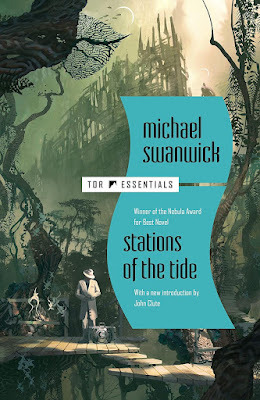The Annotated STATIONS OF THE TIDE (Part 4)
.

Part 4! I begin to think it's possible I may bring the notations all the way to the end. Again, I have to apologize for the fact that these notations are scattershot and incomplete. Some sources don't spring to mind immediately, while others are skipped lightly over for a variety of personal reasons. The technique allowing a man to achieve orgasms without ejaculation does, yes, work, but I'd have to do digging into the far reaches of my books to find the references and life is short.
Meanwhile, a soupcon more insight into my novel:
Page 44:
“I killed a dog today”: WhenI was at William & Mary, struggling to pass German (I never did get good atit), I tried writing a story in German and only got as far as the opening line:Ich tötete heute einen Hund. This fact is of absolutely no importance. Imention it only to demonstrate how much more goes into any substantive piece ofwriting than the reader suspects.
Page 46:
Campaspe: Thename is taken from E. R. Eddison’s A Fish Dinner in Memison. In it,Campaspe is a sylph, whose human form alternates with that of a water-rat.
Page 50:
St. Jones's:There is no such saint. But the St. Jones is a river in Delaware. No one knowsthe origin of its name but it is speculated to derive from St. Joan or else St.Jone, a variant Welsh spelling of St. Ione or John.
Page 60:
Clay Bank: Aneighborhood in Gloucester County, Virginia. Will Jenkins who, writing asMurray Leinster, was the original Dean of Science Fiction, lived there.
Cobbs Creek:A neighborhood in West Philadelphia, and a creek defining part of Philadelphia's border.
Page 61:
remscela: Alittle joke here. The remscela are the prequel-tales to the Táin Bó Cúailnge in the Ulster Cycle and Remscelais the title of a Celtic fantasy novel by my friend Gregory Frost. On Mirandait is apparently also a form of alcohol.
Page 62:
fantasias:I have usurped an existing word here as the name for elaborately fantasticcostumes specific to carnival onMiranda.
Page 63:
jubilee: In Biblical times, after seven weeks of years--half a century--came the jubilee, a time of transformation, when all debts were forgiven and slaves freed. The time of the jubilee tide is, similarly, a time of physical transformation and, for some, spiritual transcendence.
Page 65:
Undine: In Miranda, awitch; in our world, the name of a water-nymph. The word was coined byParacelsus in his alchemical writings and popularized by Undine, an 1811novella by Friedrich de la Motte Fouqué. A knight falls in love with the wildand capricious young nereid. Marriage, however, gives her a human soul andmakes her virtuous in the drearily long-suffering Christian manner of the times.The knight proves unworthy and they both die—but romantically.
Page 68:
iridobacteria: Anonce-word, but in context self-evident.
Page 71:
nerve-inductor: Anobvious swipe from Frank Herbert’s Dune. I am astonished Ineglected to include it in the Acknowledgements page. Somehow, I forgot all about it.
Page 82:
“A new age of magical interpretation…”:This is a quote from Adolph Hitler.
Page 83:
Veilleur: Frenchfor “watchman.” There was a strong French (and French Carribean) component tothe original human settlers of Miranda, as well as a lesser Armenian component.
Page 87:
the golden woman: Theponcho-clad puppet who dissolves in a shower of golden rings is taken from C.L. Moore’s classic story, “No Woman Born.”
*
Michael Swanwick's Blog
- Michael Swanwick's profile
- 552 followers



